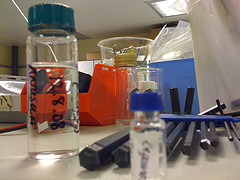The ACT Science Test - What Do Students Need to Know?


The ACT test requires students to know and apply grade level fundamentals in reading, writing, math and science. The addition of the science test is what makes the ACT unique compared to other standardized tests. The ACT science test is called a “science reasoning test” precisely because it is created to assess a student’s ability to process and reason through data contained primarily in graphs, charts, tables and diagrams.
The challenge is for students to reason through this data with efficiency and accuracy. Colleges look favorably on ACT science test scores as additional academic data that helps evaluate student aptitudes, particularly those students entering degree programs within scientific fields. Here are three key ideas to know before taking this test:
Think Fast!
The ACT is divided into five sections: English, math, reading, writing and science. The science portion of the test is one of the shorter sections and is only allotted 35 minutes to complete. The math and English sections get 60 and 45 minutes, respectively. This time differential is important because students will need to know how to wade through the science questions quickly (and accurately) to be beat the clock and have enough time to answer all questions.
Some test advisors recommend “skimming” through the dense language in the questions to find the key points quickly, or reading the questions first. By far the most important point experts agree on is that focusing on the given diagrams, tables, and graphs is the quickest way to the correct answer.
Know When to Slow
There will be a few questions on the science test that will require students to read a dense text to find the answer. Students should spend the time reading these questions carefully and consider them reading comprehension questions. The basic view is that there will likely be less than 10% of these scientific reading comprehension questions on the test. These questions will not usually have accompanying graphs or charts either.
On the Page
Another key to preparing for (and taking) the ACT science test is knowing that the answer to each question is on the page. Regardless of the topic being tested, students should be able to reason their way to the correct answer simply by using the data provided.
Actually, there may even be questions that relate to specific (advanced) science that most high school students have not been taught. Fear not! These questions are meant to test whether a student can understand what is being asked and (again) interpret the given data. Even the math required to answer most questions on the science test is very basic math, and is not often required to reach the answer.
Honing reasoning skills is more important than studying every scientific theory to prepare for this test. Students can ace the ACT science section by knowing how to interpret, recognize and read data effectively and in a timely manner. If students can reason well, there’s every reason to believe they’ll score well on this test!

